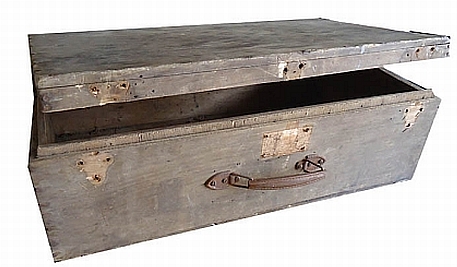
The night warm, beautiful, still with some Christmas lights hanging from the balconies and the sounds of dance music coming from the houses. As 2012 ended along the central avenues of Vedado one could perceive a particular effervescence. Dozens of people were walking in circles carrying suitcases, large or small, old or brand new. A curious festive practice that has been added to the existing traditions for celebrating the New Year in Cuba.
At the exact stroke of twelve on December 31, many enlist their suitcase for a brief walk. For decades the most common custom has been throwing water from the balconies, soaking the streets — along with the sidewalks and the occasional naive passerby — with the precious liquid to wash away all the ills of the previous year. But now we have the growing habit of taking a walk with a suitcase, the larger the better.
According to the enthusiasts of this new practice, this works as a spell to be able to travel outside the country; as a kind of magic act that will help them realize the dream of coming to know other places. In the last five years a growing number of Cubans perform this rite at the exact minute the new year begins. In 2013 it was truly prescient, because tomorrow, January 14, the new Migratory Reform Law goes into effect, promising flexibility around leaving and entering the country.
According to Decree-Law No. 302 announced last October, the procedures to travel will become less cumbersome and will cost less. And so, the dreams of many to visit another country, temporarily or permanently, are growing.
For decades we Cubans have been waiting for the end of the travel and migration absurdities. Most Cuban families have been affected to a greater or lesser degree by the restrictions imposed on the freedom of movement. Parents are separated from their children by thousands of miles and a mountain of legal limitations. Grandparents never meet their grandchildren because the government refuses them authorization to enter the Island. Brothers and sisters never see each other again because one of them can’t fulfill the requirements for the “White Card” as the exit permit is known.
Those who ask for permission to leave must pass political tests. So an individual who was a member of any opposition group, who engaged in independent journalism, or undertook any type of civic activity, found their chances greatly reduced. Only if they agreed to leave “definitively” — forever, and with no hope of return — would the authorities let them go.
The expectations generated by the new law are seen everywhere. Classified ads for houses have increased on the online sites dedicated to buying and selling. Many properties in the country are being turned into the capital needed to start a new life somewhere else. “Sell to leave” seems to be the motto of those who have been waiting for this moment for a very long time.
But there are also those who want to take advantage of the expected travel flexibility to stay only temporarily in another country, under a work contract. The rules that will take effect in just a few hours will foster precisely this type of migration: economic emigration that maintains ties with the Island, for people who will continue to send money home.
Children will also benefit, because for long years children could leave only if their parents were on an official mission to another country, or if they were leaving for good. However the professionals classified as “vital” could start to face major difficulties when it comes time to accept an invitation to travel abroad. High level athletes, for example, will continue to face restrictions. Public health personnel, however, speculate that they will see a lessening of the controls that have forced them to wait five years after initiating a request to leave for their “liberation,” which must be awarded by the minister of whichever branch they work in.
As with every “Raulista reform,” it’s worth the trouble to read the fine print, especially in Decree-Law No. 302. Special interest should be paid to Articles 23 and 25; sections in both warn that individuals will not be able to get a passport nor to leave the country “for reasons of the public interest as determined by the responsible authorities.”
The possible meanings of this are so broad and so confusing that it could encompass almost any consideration. The big question asked by many is whether such a limitation will also be applied in the case of Cuban dissidents. Will those who are on the black list today continue to be so tomorrow? Will opposition activity continue to be one of the obstacles that prevents you from getting this document with the blue cover and the shield of the republic, indispensable for crossing our frontiers?
Everything indicates, at least at this point, that things will remain as they are now. For this reason nowhere in the new law is the act of traveling spoken of as an inherent right of every citizen from the simple fact of being born on Cuban soil. The exit permit has become a permit to have a passport, but it will remain a sinecure, a gift.
With so much uncertainty hanging over our heads, we will need a large dose of luck and some spell of enchantment. So, many of those who plan to see the dawn tomorrow at their local Office of Immigration and Aliens, took a walk with their suitcases on December 31, sharing in this ritual filled with hope.
13 January 2013
